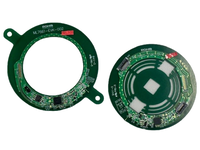BU33TD2WNVX
200mA 3.3V, Fixed Output, High PSRR, High-Accuracy CMOS LDO Regulator
BU33TD2WNVX
200mA 3.3V, Fixed Output, High PSRR, High-Accuracy CMOS LDO Regulator
The BU**TD2WNVX / BU**TD3WG series integrates a 200mA output high performance FULL CMOS regulator into an ultra-compact SSON004X1010 package (1.0mm×1.0mm×0.6mm) & SSOP5 package(2.9mm×2.8mm×1.15mm). Additional features include a circuit current of only 35µA for low power consumption along with superior noise and load response characteristics, making them ideal for use in power supplies for a wide variety of applications, including logic ICs, RF circuits, and camera modules.
For Automotive usage, please contact Sales.
Product Detail
Specifications:
ch
1
Withstand Voltage (Max.)[V]
6.5
Vin(Min.)[V]
1.7
Vin(Max.)[V]
6
Iout(Max.)[A]
0.2
Vout Type
Fixed
Vout Accuracy
±1.0% (Ta=25℃)
Circuit Current[mA]
0.035
Dropout Voltage (Typ.)[V]
0.22(Io=0.2A)
Ripple Rejection [dB]
70
Load Regulation[mV]
10(Io=0.01mA to 100mA)
Output Capacitor[µF]
0.22
Shutdown Function
Yes
Thermal Shut-down
Yes
Over Current Protection
Yes
Over Voltage Protection
No
Under Voltage Lock Out
No
Discharge Function
Yes
Soft Start
No
Operating Temperature (Min.)[°C]
-40
Operating Temperature (Max.)[°C]
85
Features:
・High-accuracy output voltage of ±1% (±25 mV on Vout < 2.5V products)・High ripple rejection: 70 dB (Typ., 1 kHz,)
・Compatible with small ceramic capacitor (CIN=Co=0.47 µF)
Reference Design / Application Evaluation Kit
-

- Reference Design - REF67011
- NFC Telemetry-Based Rotating Component Torque Sensing
In this reference design, a strain sensor and the ML7660-EVK-002 are attached to the shaft. It is now possible to directly measure and collect data on the strain of the rotating shaft, which was previously impossible.
Specifically, the measurement process follows these steps:
1) The power supply LSI wirelessly supplies power to the power receiving LSI.
2) The power receiving LSI supplies power to the strain sensor via a wired connection.
3) The strain sensor measures the strain of the rotating shaft.
4) The strain sensor sends the strain measurement data to the power receiving LSI via a wired connection.
5) The power receiving LSI wirelessly transmits the measurement data to the power supply LSI.This reference design uses the STREAL SR300 sensor manufactured by Glosel. If you plan to use Glosel sensors, please check directly with Glosel for availability and procurement details in advance.
https://www.glosel.co.jp/en/contact/

